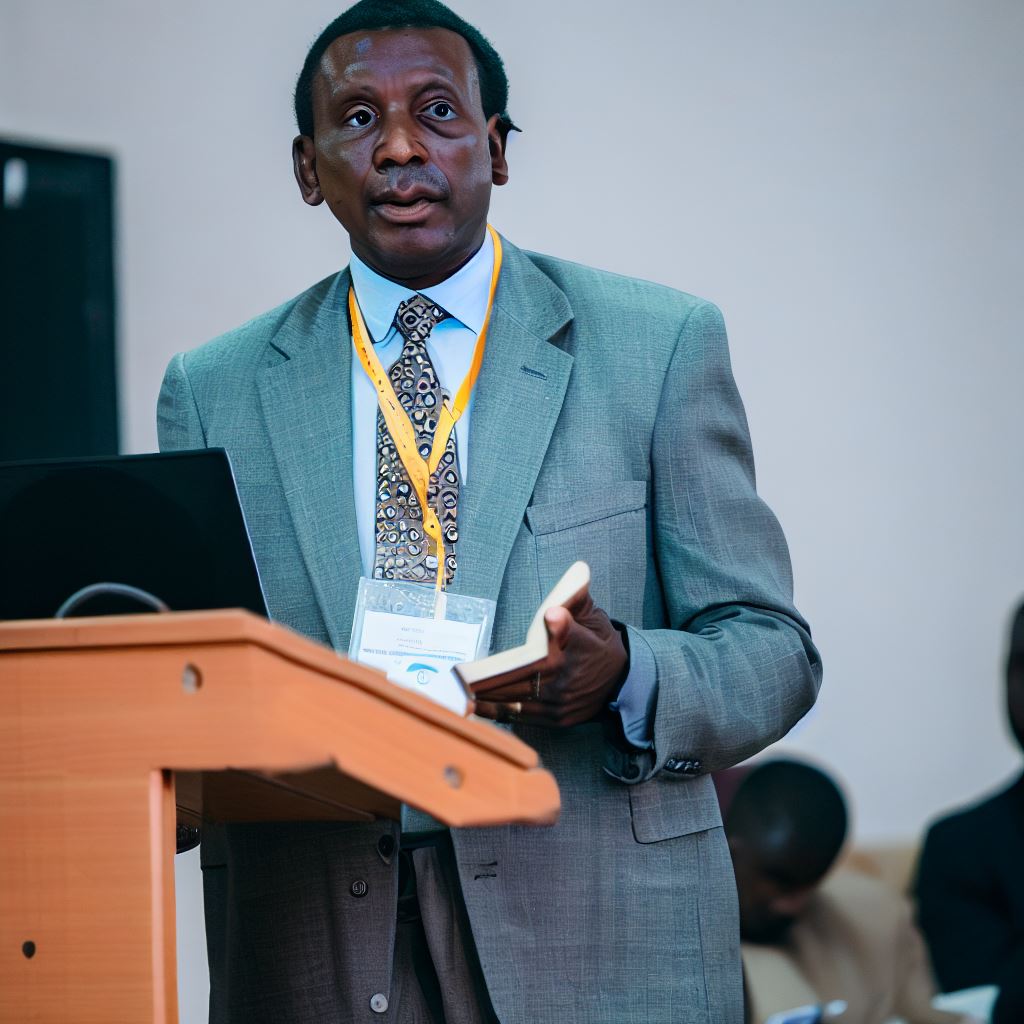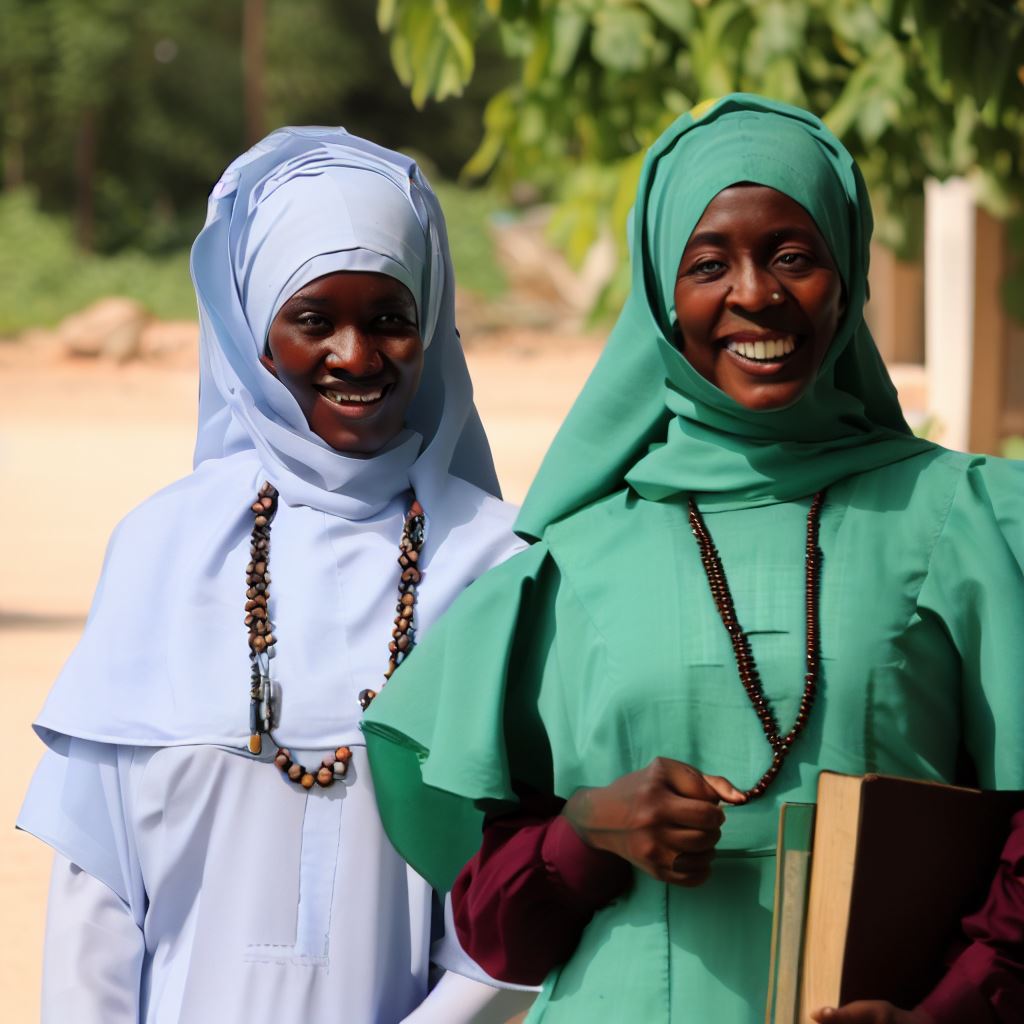Introduction
A. Interfaith Dialogue
Interfaith dialogue fosters understanding among diverse religious communities.
It promotes tolerance, peace, and cooperation, transcending differences.
B. Role of Imams in Nigeria
Imams in Nigeria today serve as crucial bridge-builders.
They facilitate interfaith conversations, promote religious harmony, and guide their congregations towards unity and coexistence.
Historical Perspective
A. Strong religious traditions in Nigeria
- Nigeria is known for its strong religious traditions.
- The country has a rich history of coexistence between different religious groups.
- Interactions between Christians and Muslims have shaped the country’s religious dynamics.
- Historically, Nigeria has experienced tensions and conflicts between these two major religious groups.
- Interfaith dialogue plays a crucial role in addressing these tensions and promoting peaceful coexistence.
B. Historical dynamics between different religious groups
- It is important to understand the historical context to appreciate the significance of interfaith dialogue in Nigeria.
- The early years of Nigeria’s independence were marked by intense religious divisions.
- Muslim and Christian leaders played influential roles in shaping the religious landscape of the country.
- This historical context highlights the need for interfaith dialogue to bridge religious divides.
- Interfaith dialogue aims to foster understanding, tolerance, and cooperation between religious groups.
- Violent clashes between religious groups have hindered Nigeria’s development and stability.
- Interfaith dialogue empowers religious leaders, including Imams, to be agents of peace and unity.
- Imams, as respected religious figures, have the potential to promote harmony and peace in Nigeria.
C. The need for interfaith dialogue in the country
- Engaging Imams in interfaith dialogue is crucial to ensure a sustainable peaceful coexistence.
- Historically, Imams have played important roles in promoting peaceful relations between Muslims and Christians.
- The involvement of Imams in interfaith dialogue can help dismantle stereotypes and misconceptions.
- Interfaith dialogue led by Imams can contribute to the reduction of religious tensions and conflicts.
- The historical dynamics have set the stage for Imams to address religious prejudices and misunderstandings.
- The inclusion of Imams in interfaith dialogue demonstrates the commitment to religious pluralism and harmony.
- Nigeria’s reality necessitates the active participation of Imams in interfaith dialogue initiatives.
- Imams can provide religious insights and guidance, enhancing the effectiveness of interfaith dialogue.
- The historical significance of Imams makes them influential leaders in fostering peace and stability.
Through a historical lens, it becomes evident that the role of Imams in Nigeria’s interfaith dialogue is essential.
Their involvement is crucial for promoting understanding, peace, and harmony among religious communities in the country.
Leveraging their respected position, Imams can create lasting change that contributes to Nigeria’s socio-religious cohesion.
Read: Youth Education: How Imams Shape Minds in Nigeria
Understanding Interfaith Dialogue
A. Definition of interfaith dialogue
Interfaith dialogue refers to the process of communication and engagement between individuals of different religious beliefs in order to promote understanding and cooperation.
Interfaith dialogue is a powerful tool that can bridge the gaps between different religious communities, promoting understanding, empathy, and peaceful coexistence.
It serves as a platform for individuals of diverse faiths to come together and engage in meaningful conversations, fostering respect and cooperation.
B. Importance of promoting understanding, respect, and cooperation among different religious communities
Interfaith dialogue plays a crucial role in fostering mutual respect, breaking down stereotypes, and building bridges between diverse religious communities.
It encourages peaceful coexistence and enables people to embrace their differences while finding common ground.
The importance of promoting understanding, respect, and cooperation among different religious communities cannot be overstated.
In a world where religious conflicts and intolerance persist, interfaith dialogue offers a way to transcend differences and build lasting relationships based on mutual understanding and acceptance.
It helps dispel misconceptions, stereotypes, and prejudices that often fuel religious tensions.
By promoting interfaith dialogue, imams can help create an atmosphere of trust and collaboration among religious communities, paving the way for social cohesion and development.
Furthermore, interfaith dialogue among imams can lead to joint initiatives and projects that address common challenges faced by communities, such as poverty, education, and healthcare.
By working together, imams can harness the collective resources and expertise of religious communities to bring about positive change and enhance social welfare.
C. Relevance of interfaith dialogue in Nigeria’s diverse religious landscape
In the Nigerian context, interfaith dialogue holds particular relevance due to the country’s diverse religious landscape.
With a significant population of both Muslims and Christians, Nigeria has experienced religious conflicts in the past.
Interfaith dialogue, therefore, becomes essential in fostering unity and peaceful coexistence among these communities.
The involvement of imams in interfaith dialogue is crucial. Imams are influential religious leaders who can play a significant role in promoting peace and understanding within their communities.
By actively engaging in interfaith dialogue, imams can demonstrate the values of tolerance, respect, and cooperation to their followers.
Through interfaith dialogue, imams can address misunderstandings, misconceptions, and prejudices that exist among the followers of different religions.
They can promote a culture of peace, where individuals can learn from one another’s beliefs and practices, fostering a climate of tolerance and respect.
Imams can also serve as mediators during religious conflicts, using their position to reconcile differences and encourage dialogue rather than violence.
In essence, interfaith dialogue is of utmost importance in today’s world, and specifically in Nigeria’s diverse religious landscape.
It offers a pathway to peace and harmony, allowing individuals of different faiths to come together, learn from each other, and build meaningful relationships.
The active participation of imams in interfaith dialogue can contribute significantly to promoting understanding, respect, and cooperation among religious communities in Nigeria, ultimately leading to a more inclusive and harmonious society.
Read: The Ethics and Moral Standards for Imams in Nigeria
Role of Imams in Nigeria
A. The position and significance of Imams in the Islamic faith
Imams hold a revered position in the Islamic faith, serving as spiritual leaders and guides. They are responsible for leading congregational prayers and delivering sermons on religious teachings.
Imams also play a crucial role in interpreting the Quran and providing religious guidance to Muslims.
Their deep knowledge of Islamic principles and teachings allows them to offer counsel and resolve religious dilemmas.
Moreover, Imams act as moral exemplars, embodying the values of compassion, patience, and humility.
B. Traditional duties and responsibilities of Imams in Nigeria
In Nigeria, Imams have several traditional duties and responsibilities that strengthen the fabric of their communities.
First and foremost, they lead congregational prayers at mosques, ensuring that Muslims come together in worship.
Imams are also responsible for conducting religious ceremonies, including weddings, funerals, and other significant events.
They play a crucial role in promoting unity and fostering a sense of belonging among Muslims. Imams often lead Islamic educational programs, teaching children and adults about their faith and its core principles.
Additionally, they actively engage in outreach efforts, promoting interfaith dialogue and peaceful coexistence.
C. Impact of Imams on their communities
Imams have a profound impact on their communities in Nigeria. Their role extends beyond religious matters, as they often assume leadership positions in social and civic activities.
Imams are influential figures who help address social issues, such as poverty, education, and healthcare.
They serve as advocates for justice, equality, and moral values, creating awareness and encouraging positive change.
Imams actively engage in community development initiatives, establishing schools, healthcare centers, and other essential facilities.
Their guidance and counseling provide solace and support to individuals facing personal, emotional, or spiritual challenges.
Imams’ commitment to promoting peace and understanding ensures harmonious relations among diverse groups within society.
In fact, the position of Imams in Nigeria holds significant importance in the Islamic faith. Their traditional duties and responsibilities extend beyond religious matters, impacting communities in numerous ways.
Imams play a vital role in providing spiritual guidance, fostering unity, and promoting the values of compassion and justice.
Their positive influence contributes to the socio-economic development and peaceful coexistence of Nigerian society.
Read: Influence of Nigerian Imams in Global Islamic Thought

Contemporary Challenges
A. The current religious tensions and conflicts in Nigeria
In Nigeria, religious tensions and conflicts have reached alarming levels, posing significant challenges.
These conflicts are primarily between the Christian and Muslim communities, causing widespread violence and destruction.
The clashes stem from deep-rooted misunderstandings, evolving political dynamics, and economic inequalities.
Many innocent lives have been lost, properties destroyed, and communities left fractured as a result. The severity of these challenges calls for immediate attention and proactive measures to restore peace.
B. The negative effects of misunderstandings and lack of dialogue
Misunderstandings and a lack of dialogue aggravate the existing religious tensions, further fueling conflicts.
Limited understanding about each other’s beliefs and practices perpetuates stereotypes and fosters hatred.
This lack of engagement allows extremist elements to exploit the situation, spreading radical ideologies.
Communities become isolated, trust is eroded, and the social fabric of the nation is weakened.
Economic growth and development suffer, as investments and businesses are deterred by the unstable environment.
C. Need for Imams to play a more active role in promoting interfaith dialogue
Imams, as influential religious leaders, have a crucial role to play in promoting interfaith dialogue.
They possess the authority and knowledge to guide their followers towards understanding and tolerance.
Imams can actively engage with their Christian counterparts to foster mutual respect and harmony.
Additionally, they can organize forums, seminars, and conferences to facilitate open dialogue and bridge divides.
Imams must actively preach the importance of coexistence, unity, and respect for all religions.
They can promote peace education, dispel misconceptions, and eradicate the seeds of hatred through their sermons.
By actively participating in interfaith activities, Imams can inspire their communities towards peaceful coexistence.
Furthermore, they should denounce violence and radical ideologies within their circles, guiding their followers onto a path of non-violence and understanding.
Imams must also support and collaborate with government initiatives aimed at promoting interreligious dialogue.
Read: Cultural Influences on the Imam Profession in Nigeria
Importance of Imams in Facilitating Interfaith Dialogue
A. The Influence and Authority Imams Hold within Their Communities
- Imams play a prominent role in the Islamic community, acting as spiritual leaders and guides.
- They possess extensive knowledge of Islamic teachings and are respected for their wisdom.
- Their authority stems from their understanding of religious texts and their ability to interpret them.
- Imams hold significant influence over the religious practices and beliefs of their followers.
- They have the power to shape the mindset of their community and promote unity and tolerance.
B. How Imams Can Bridge the Gap and Foster Peaceful Coexistence
- Imams act as mediators between different religious groups, bridging the gap in understanding.
- They have the unique ability to communicate and relate to both Muslims and people of other faiths.
- Through their sermons and teachings, Imams can spread messages of peace, love, and acceptance.
- They can address misconceptions about Islam and promote empathy and mutual respect.
- Imams can contribute to reducing tensions and conflicts by encouraging dialogue and cooperation.
C. Examples of Successful Interfaith Initiatives involving Imams in Nigeria
- The Interfaith Mediation Center (IMC) in Kaduna promotes peaceful coexistence between Muslims and Christians.
- IMC recruits and trains Imams to engage in interfaith dialogue and work towards religious harmony.
- The “Imams for Peace” initiative brings together Muslim leaders from different communities to foster understanding.
- Through workshops and seminars, Imams learn strategies to promote interfaith dialogue and resolve conflicts.
- The Sultan of Sokoto, the spiritual leader of Nigerian Muslims, has actively advocated for peace and religious tolerance.
Overall, the role of Imams in interfaith dialogue cannot be underestimated. They possess the influence and authority to shape their communities’ beliefs and practices.
Through their teachings, they can bridge the gap between different faiths and promote peaceful coexistence.
Successful initiatives involving Imams in Nigeria, such as the Interfaith Mediation Center and “Imams for Peace,” demonstrate the positive impact they can have on fostering understanding and unity among different religious groups.
It is crucial to recognize and support the efforts of Imams in facilitating interfaith dialogue, as they hold the key to promoting a more inclusive and tolerant society.
Uncover the Details: The Impact of Religion: Nigeria’s Clergy and Society
Initiatives and Strategies
Interfaith dialogue is crucial in promoting peaceful coexistence and harmony in Nigeria. Imams, as influential religious leaders, have taken up the responsibility of leading and engaging in interfaith dialogue programs.
Through their initiatives and strategies, they have successfully bridged the gap between different religious groups.
A. Existing interfaith dialogue programs led by Imams
One notable program led by Imams is the Peaceful Coexistence Initiative. This initiative focuses on fostering understanding and unity among various religious communities.
Imams actively participate in organizing events, such as interfaith prayer gatherings and seminars, where they encourage dialogue and exchange of ideas.
Another significant program is the Interfaith Bridge Project. Imams play a pivotal role in this project, working hand in hand with leaders from different religious backgrounds to build bridges and promote mutual respect.
Their success lies in engaging in respectful and open dialogue, which allows for meaningful conversations that challenge misconceptions and foster understanding.
B. Successful strategies employed by Imams to engage different religious groups
Imams also employ successful strategies to engage different religious groups.
They prioritize respectful and open dialogue, creating an environment where individuals feel comfortable expressing their beliefs and opinions.
By organizing educational workshops and seminars, Imams provide opportunities for their congregations to learn about different religions, promoting empathy and reducing religious tensions.
Interfaith prayer gatherings have also proven to be effective in bringing diverse religious groups together. Imams initiate these gatherings, emphasizing shared spirituality and communal harmony.
Such events serve as powerful symbols of unity and peace, showcasing the significance of interfaith dialogue in fostering understanding and cooperation.
C. Resources and tools for promoting interfaith dialogue among Imams
To further support Imams in their efforts, various resources and tools are available for promoting interfaith dialogue.
Comprehensive guides offer practical tips and guidance on how Imams can effectively engage in dialogue.
Publish Your Professional Profile, Business or Brand
Showcase your expertise, gain trust, and boost visibility instantly on Professions.ng.
Publish NowOnline platforms provide opportunities for Imams to connect with religious leaders from different faiths, facilitating discussions and fostering collaborative efforts.
Training programs specifically tailored for Imams are also beneficial. These programs equip Imams with the necessary skills to navigate complex religious conversations and promote understanding.
Moreover, resource centers offer a wealth of books, articles, and videos on interfaith dialogue, strengthening Imams’ knowledge and enhancing their ability to engage with diverse religious communities.
In a nutshell, Imams in Nigeria play a vital role in promoting interfaith dialogue.
Through their initiatives, strategies, and the utilization of available resources, they have successfully fostered harmony and understanding among different religious groups.
By continuing to prioritize dialogue and engagement, Imams can contribute to building a more tolerant and inclusive society in Nigeria.
Conclusion
A. Role of Imams in Nigeria Today
Imams in Nigeria are influential spiritual leaders who guide their communities towards peace, tolerance, and unity.
B. Significance of Interfaith Dialogue
Interfaith dialogue remains paramount for sustainable peace in Nigeria, where diverse religious communities coexist.
C. Encouragement for Imams
Imams must actively engage in initiatives promoting understanding and cooperation among Nigeria’s religious groups. Together, we can build a harmonious nation.




